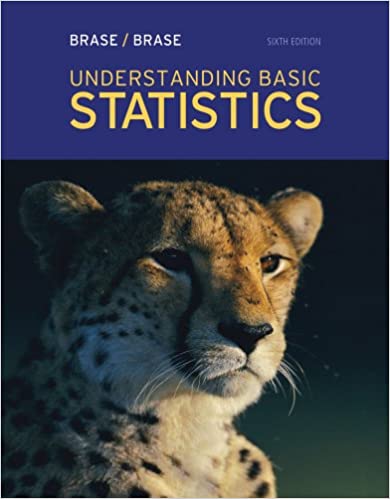
Understanding Basic Statistics 6th Edition by Charles Henry Brase,Corrinne Pellillo Brase
Edition 6ISBN: 978-1111827021
Understanding Basic Statistics 6th Edition by Charles Henry Brase,Corrinne Pellillo Brase
Edition 6ISBN: 978-1111827021 Exercise 152
Uniform Distribution: Measurement Error Measurement errors from instruments are often modeled using the uniform distribution (see Problem 12). To determine the range of a large public address system, acoustical engineers use a method of triangulation to measure the shock waves sent out by the speakers. The time at which the waves arrive at the sensors must be measured accurately. In this context, a negative error means the signal arrived too early. A positive error means the signal arrived too late. Measurement errors in reading these times have a uniform distribution from -0.05 to +0.05 microseconds.
(Reference: J. Perruzzi and E. Hilliard, "Modeling Time Delay Measurement Error," Journal of the Acoustical Society of America , Vol. 75, No. 1, pp.197-201.) What is the probability that such measurement will be in error by
(a) less than +0.03 microsecond (i.e., -0.05 x 0.03)
(b) more than -0.02 microsecond
(c) between -0.04 and +0.01 microsecond
(d) Find the mean and standard deviation of measurement errors.
Measurements from an instrument are called unbiased if the mean of the measurement errors is zero. Would you say the measurements for these acoustical sensors are unbiased Explain.
(Reference: J. Perruzzi and E. Hilliard, "Modeling Time Delay Measurement Error," Journal of the Acoustical Society of America , Vol. 75, No. 1, pp.197-201.) What is the probability that such measurement will be in error by
(a) less than +0.03 microsecond (i.e., -0.05 x 0.03)
(b) more than -0.02 microsecond
(c) between -0.04 and +0.01 microsecond
(d) Find the mean and standard deviation of measurement errors.
Measurements from an instrument are called unbiased if the mean of the measurement errors is zero. Would you say the measurements for these acoustical sensors are unbiased Explain.
Explanation
We are given measurement errors that are...
Understanding Basic Statistics 6th Edition by Charles Henry Brase,Corrinne Pellillo Brase
Why don’t you like this exercise?
Other Minimum 8 character and maximum 255 character
Character 255


